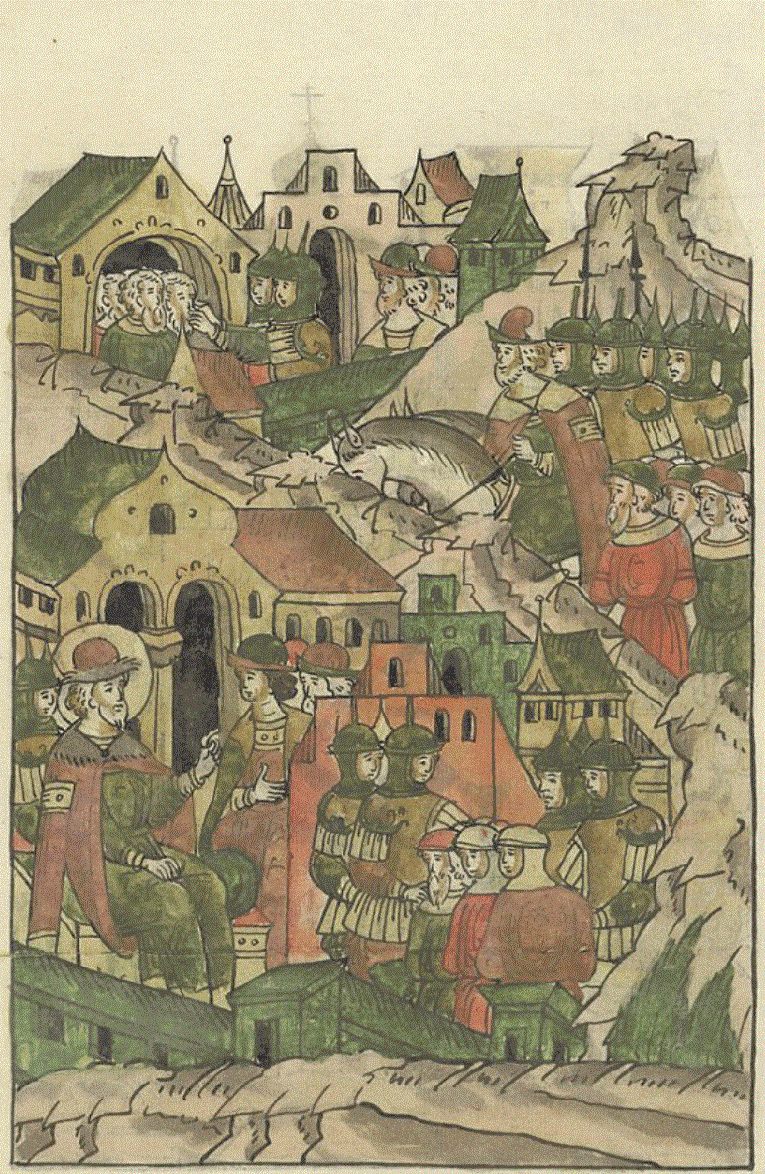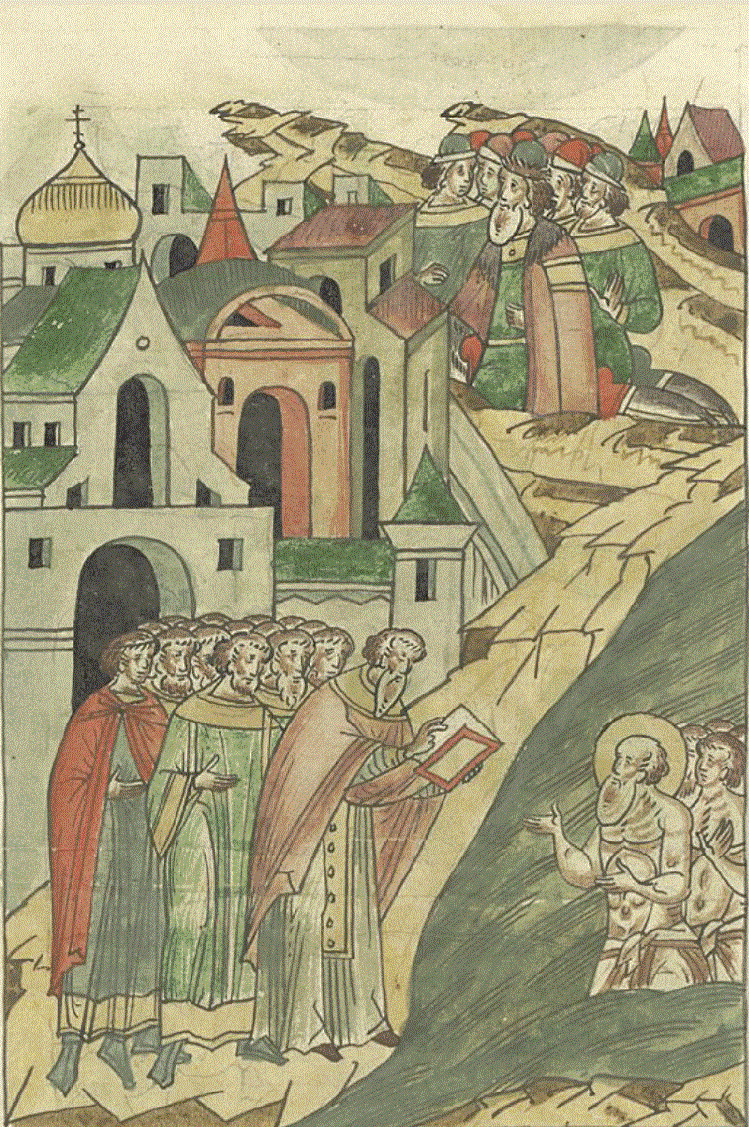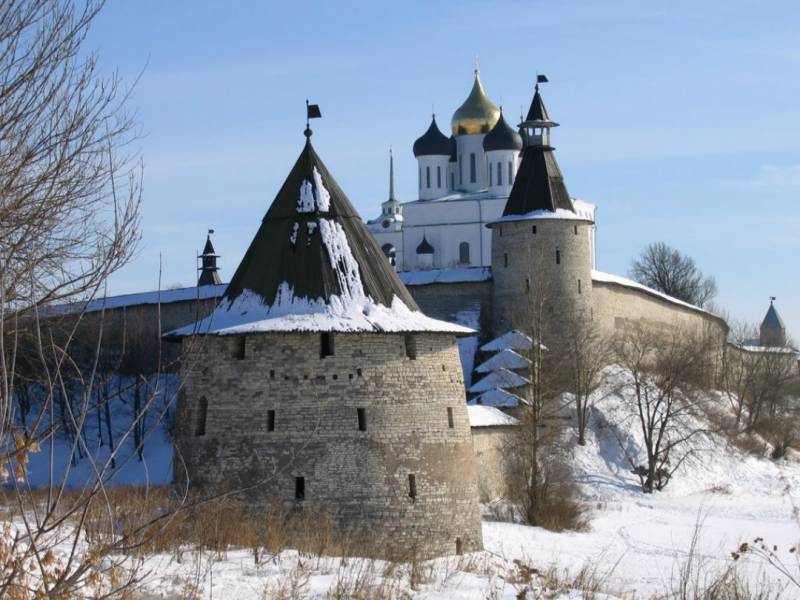Russia is a single state. Pskov
Article Russia or Muscovy I wrote that the state of Rus, in the opinion of the inhabitants of the country themselves and foreigners, did not disintegrate in the second half of the XII-XIII century.
That is, Russia of the IX century, X, XI, XII, XIII, XIV, XV, XVI and so on centuries - the same state... "Kievan Rus", "Vladimirskaya Rus", "Muscovy Rus" are not and were not states - these are terms introduced by historians in the XNUMXth century, denoting periods stories one state - Russia.
"Novgorodskaya Rus" - the period when Novgorod was the capital of Rus, "Kievan Rus" - Kiev, "Vladimirskaya Rus" - Vladimir, "Moskovskaya Rus" ...
I suggest that readers themselves answer the question about the name of the capital of Russia in this period of history.
The state was ruled by “princes / sovereigns / kings of all Russia”. Not "Moscow and Russia", not "Tartaria and all galaxies", but simply and tastefully - "All Russia".
What did the princes of all Russia own?
As strange as it may sound, the rulers of all Russia ruled all of Russia.
Another thing is that from the middle of the XIII century to the beginning of the XV century, the Poles and Lithuanians, taking advantage of the weakening of Russia by the horde, conquered part of the state: Polotsk, Kiev, Chernigov, Novgorod-Seversk, Pereyaslavsk, Galicia-Volyn principality and part of the Smolensk principality (moreover, the Russian principalities of Lithuania the princes conquered and annexed Lithuania, buying labels for the management of these lands from the Horde Khan and promising to pay tribute from these lands).
The rest of Russia was not conquered. Pskov, Novgorod, Nizovskaya volosts, Ryazan principality remained under the control of the rulers of all Russia - the Russian princes Rurikovich.
And yet there was a strong myth that the state of Russia in the second half of the XII-XIII centuries collapsed and by the XIV century, allegedly, there were several independent states on its territory.
As an example of such an "independent state", they usually cite the "Pskov Republic" or, more pretentiously, the "Pskov Veche Republic": supposedly this state was annexed to Russia only by Vasily III.
But the Pskovians themselves had no idea that they lived in an independent state, and even more so in the "Pskov Republic" - from their point of view, they lived in the state of Russia, Pskov was part of Russia, and the rulers of Russia were the legitimate rulers of Pskov. Pskov and the surrounding area were called "Pskov volost" or "Pskov region".
From the Pskov First Chronicle:
... and you yourself will go to Pskov volost.
The name "volost" or "region" should already hint that Pskov was not independent, but was a part (region) of some other larger state - this "some" state was Russia.
We also note that the Pskov volost is the birthplace of the wife of Prince of Russia Igor Rurikovich Olga - that is, it directly refers to the Rurikovich.
Pskov IX-XIII centuries
The history of the city of Pskov goes back centuries, but in the second half of the XNUMXth century (the reign of Prince Rurik) the Pskov volost (however, then the political center of the region was not Pskov, but neighboring Izborsk) is already part of the Russian state, and the rulers of Pskov are the rulers of all Russia. In fact, the prince's governor rules in the parish.
In the 1036th century, such a governor was the son of the ruler of Russia, Vladimir Svyatoslavich (or his nephew, the son of Oleg Svyatoslavich) Sudislav. In XNUMX, Yaroslav Vladimirovich took him into custody - as a result, the Pskov principality (the center had already shifted from Izborsk) was annexed to Novgorod and ruled by the Novgorod prince by appointing a mayor in Pskov.
In the XII century, another dynastic struggle of princes began for the right to rule all of Russia.
Pskov and Novgorod, as very important cities of Russia, became the arena of confrontation between the branches of Yurievich and Mstislavich. The confrontation went on with varying success: either the Yurievichs who had entrenched themselves in Novgorod knocked out the Mstislavichs from Pskov, then the Mstislavichs returned to Pskov and knocked the Yuryevichs out of Novgorod.
As a result: in the XIII century, the Yuryevichs were entrenched in Pskov (Yaroslav Vladimirovich's flight from Pskov to the Germans from the branch of the Mstislavichs, followed by the distribution of the Pskov territories, which did not find support among the Pskovites), contributed to the transition to the power of the Yuryevichs (the governor and brother-in-law were sent to the city in 1232) Prince of Novgorod Yaroslav Vsevolodovich (brother of the ruler of Russia) Yuri Mstislavich.
The fact that Pskov in the middle of the XIII century was part of Russia and was under the control of the Vladimir branch of the rulers of Russia is also noted in foreign sources.
From the Older Livonian Chronicle:
...Pskov city in Russia called,
which is located in those parts.
In 1240 the Teutons conquered Pskov. But already in 1241 the commander and son of the ruler of Russia Yaroslav Vsevolodovich Alexander Yaroslavich Nevsky was sent to liberate Pskov, who successfully coped with the task.
it is called Novgorod.
This news reached the prince,
he gathered with many troops
against Pskov, this is the truth.
There he arrived with great strength;
he brought many Russians,
that free the people of Pskov...
... There is a city, great and beautiful,
Situated in Russia,
Который Suzdal called.
That husband's name was Alexander.
From the point of view of the Teutons, Pskov, Novgorod and Suzdal are cities of one state of Rus. The failed Tefton conquerors cannot be suspected of sympathy for Russia or the desire for the unity of the Russian state, but due to the type of their conquering activities, they had to be objective in order to sensibly assess the capabilities of their opponents.

In the 1250s, Yaroslav Yaroslavich and Vasily Alexandrovich (respectively, the younger brother and son of the ruler of Russia Alexander Yaroslavich) reigned periodically in Pskov.
In 1265, Svyatoslav Yaroslavich, the son of Yaroslav Yaroslavich, reigned in Pskov.
Dovmont
The reign of Prince Dovmont can be cited as an example of the "freedom" of Pskov and the right to invite any Lithuanian princes. Dovmont was indeed a Lithuanian, but to understand how he became the prince of Pskov, you need to return to the reign of Svyatoslav.
In 1265–1266, the son and governor of Russia, Yaroslav Yaroslavovich, accepted into citizenship and baptized about 500 Lithuanians, with wives and children, who came to Pskov from civil strife and confusion that then took place in Lithuania. One of these refugees was Dovmont (baptized Timofey).

Further, Dovmont became related to Yaroslav Yaroslavich's nephew (and part-time Novgorod prince) Dmitry Alexandrovich - and therefore received the Pskov reign. Russian princes often appointed Lithuanian princes who had switched to the Russian service as governors in Russian cities, for example: Pskov, Novgorod, Moscow - the appointee was approved at the veche of these cities.
From the tale of Dovmont:
It is important that both the acceptance of Dovmont to Pskov and his imprisonment as governor were the initiatives of the Russian princes.
Why did they need Dovmont?
After the Horde invasion, the Lithuanian state began a large-scale offensive against Russia, weakened by this invasion. Defending against the Germans, Swedes, Danes, Russia needed allies in the region. The ideal candidate was Dovmont, who had a conflict with Lithuania advancing on Russia. In alliance with the Russians, Dovmont acted against Lithuania in the zone of interests of the Russian state - the Russian Principality of Polotsk.
Durability of the princely power
From 1232 to 1300, only 6 princes reigned in "free" Pskov: the brother-in-law of the Novgorod prince Yuri Vsevolodovich, the brother and son of the ruler of Russia Alexander Yaroslavich Yaroslav Yaroslavich and Vasily Alexandrovich, the brother-in-law of the Novgorod prince (and the ruler of Russia) Dmitry Alexandrovich ruling Dovmont - all from one families.
For comparison, 1232 princes reigned in the capital Vladimir from 1300 to 11.
That is, the princely power in Pskov was strong enough.
Central government crisis
At the beginning of the XIV century, Pskov was part of Russia, and the governor of the ruler of Russia ruled in the city.
But in 1327, the disgraced prince Alexander Mikhailovich fled to Pskov from Tver - this led to the isolation of Pskov from the rest of Russia. In 1330, Alexander fled to Lithuania, and the city returned to the control of the prince of all Russia.
The middle of the XIV century is characterized by the offensive of Lithuania to Russia, in particular, to the Pskov and Novgorod volosts.
In 1331, the Lithuanian prince Gediminus treacherously took prisoner Vasily, who was sent to Volhynia to be ordained Vladyka of Novgorod and Pskov, and two Novgorod posadniks who were with him in the embassy: Kozma Tverdislavich and Efrem Astafiev (Ephraim was also the son of a thousand Novgorod authorities) Novgorod volost, and forced those to transfer a significant part of the west of the Novgorod volost (Ladoga, Orekhov, Karelian pyatina and half of Koporye) to the subordination of Lithuania - the son of the Lithuanian ruler Narimant Gediminovich.
From the chronicle collection of the XVI century:
From the Novgorod Fourth Chronicle:
This, incidentally, is to the question of how the Lithuanian princes began to reign in Novgorod. The Novgorodians did not have any right to invite Lithuanian princes to their place, the imprisonment of a Lithuanian prince in Novgorod was not at all "the choice of free Novgorodians" - it was a raider seizure of the Novgorod princes by Lithuania.
In the same year, 1331, Alexander came to Pskov as the governor of Gediminas - that is, Pskov came under the control of Lithuania.
The reign of the Lithuanian princes in Pskov and Novgorod in the 1330s - 1340s is an example of the struggle between Russia and Lithuania: Lithuania's attempts to take control of the north-west of the Russian state and the opposition to this by the authorities of Russia, respectively - but in no way is an example of the independence of the Pskov and Novgorod volosts or "the liberties of Pskov and Novgorod in princes" and "the right to invite princes from Lithuania."
Restoring centralization of the state
Lithuanian rule was fragile. By the 1340s, Pskov returned under the control of Rus and Novgorod.
But in the early 1340s, another German offensive against Russia began. The Pskovs asked to send the governor from Novgorod to Pskov (the previous one took offense and left) and the army.
From the Pskov First Chronicle:
The Novgorodians sent an army, but, without meeting the enemy, they returned back. And in the winter of 1341, the Germans launched a full-scale attack on the Pskov volost. As a result, the people of Pskov requested help from the Lithuanian prince Olgerd.
From the Novgorod Fourth Chronicle:
Olgerd sent an army, but during his stay the Lithuanians ravaged the Pskov volost - as a result, Pskov returned to Russia under the control of the prince of All Russia and Novgorod.
Since the second half of the century, the princely power in the region has been increasing.
In 1368, the Prince of All Russia Dmitry Ivanovich sent his cousin Vladimir Andreevich Serpukhovskoy together with the Novgorodians to help the Pskovians in the defense against the Germans.
In 1380, the Pskovites were present as part of the Russian army in the Battle of Kulikovo.
In 1401, Daniil Alexandrovich was appointed governor of Pskov, Prince of All Russia, Vasily Dmitrievich.
From the Pskov First Chronicle:
In 1407, the Prince of All Russia Vasily Dmitrievich sent his younger brother Konstantin Dmitrievich.
From the Pskov First Chronicle:
In the world of 1409 Russia with Vitovt, Pskov is recognized as part of the Russian state, and the Prince of All Russia Vasily Dmitrievich is recognized as the ruler of Pskov.
From the Pskov First Chronicle:
Pskov was part of Russia.
But Russia is not a unitary state, but a federation. In modern terms, in the city there was a division of powers between the federal (governor of the prince of Russia), regional (the lords of Novgorod and Pskov - Pskov was subordinate to the Novgorod authorities) and municipal (Pskov mayor proper) levels.
This is noted in the Pskov court letter of 1397 (by the way, reached in princely certificates):
And the [Pskov] viceroy of the [Novgorod] archbishop is in charge of his own court, and the cases subject to his trial should not be examined by [either the prince] or the city judges; likewise, the viceroy of the lord should not interfere in matters liable to the princely court.
The fact that Pskov and Novgorod with self-government were part of the Russian state and were ruled by the Moscow ruler of Russia is also noted by foreigners.
From "Travels and Embassies" by Guilbert de Lannoa about a trip to Russia in 1413:
Pskov is very well fortified with stone walls and towers; and there is a huge castle in it, into which no true Christian can enter on pain of death. And this city is located at the junction of two large rivers - Molde and Pskova; he independently managedbeing in submission king Moscow.
It is noted that Pskov was part of Russia, and the rulers of the city were Russian rulers and Pskovians.
From the contractual charter of Pskov with the Livonian Order about the ten-year peace from 1417:
Pskovichi unequivocally consider themselves a part of Russia, and Vasily Dmitrievich - the ruler of his state.
Pskov is recognized as part of Russia in the future.
From the treaty charter of Veliky Novgorod and Pskov with the Bishop of Yuryevsky (Dorpat) on an armistice for 30 years from 1474:
... And on this letter and on this world I gave my hand and my seal to Prince Daniley Dmitrievich, the governor of the noble great princes ruskikh tsars, and the governor of the great princes ruskikh tsarsI prince of pskov Yaroslav Vasilyevich gave his hand and put his seal on. And the voivode of Veliky Novgorod, the mayor of Novgorod Foma Andreevich, and the ambassador of Veliky Novgorod, Onkipa Vasilyevich, kissed the cross for Velikiy Novgorod and for the entire Novgorod state and the seal of Veliky Novgorod. And in Pskov, the cross was kissed by the posadniks of the Pskov staid Alexei Vasilyevich and Mikita Laryvonovich, and to all the good people they kissed the cross for the whole of Great Pskov, and for all the Pskov cities, and for the entire Pskov state of life and the state of the world. And to the honest bishop of Yuryev, he should put a hand and seal for all Yuryev's cities; and the posadnikom Yuryevsky kiss the cross and all the good people for the whole Yuryevsky state and spill the Yuryevsky seal. The ambassadors of Yuryevsk in Pskov kissed the cross of Ivan Zemsky boyaryn Meksei and other Ivan Bobrov, Yuryev's ratman. And whoever does not smack the kiss of the cross to rule, otherwise God and the kiss of the cross, and the pestilence, and hunger, and fire, and the sword. And the konchan world was in Pskov, in the summer of 6982. And in Yuriev, the cross was kissed by the ambassadors of Pskov, Andrei Semenovich Lublev da Kura Olekseevich Shemyatov.
From Pskov's letter to Ivan Vasilyevich about sending a "folding" letter to Veliky Novgorod and about the fire of Pskov in 1477:
Was recognized as the ruler of Pskov and Vasily III.
From the contractual letter of Pskov with the Livonian Order of the Armistice for six years from 1503:
So in 1510, Vasily III could not conquer Pskov due to the fact that he was already the legal ruler of the city. In 1510, the Pskov volost just changed its status within Russia (the veche was canceled).
Why was the veche canceled
The Moscow rulers of Russia had been interacting with the Pskov veche for several centuries.
Why was this institution abolished in 1510?
The fact is that since the XNUMXth century, Pskov was the main fortpost of Russia in the northwest and a cover from the German offensive. Conflicts of the municipal authorities with the federal authorities (the Pskov mayor with the governor-prince, who was also responsible for the defense of the region) in the front-line did not contribute to an increase in the defense capability of Russia.
For example, in 1240, excessive Pskov self-government (more precisely, arbitrariness) led to the occupation of the city by the Livonians (the city was surrendered by the Pskov mayor), in the 1330s and 1340s - to the occupation of the city by the Lithuanian prince Olgerd. In the XNUMXth century, relations between Russia, the Livonian Order and the Lithuanian state were hostile, so any arbitrariness of the Pskov mayors, which could lead to a weakening of the country's defenses, seemed to the Russian rulers extremely suspicious and extremely undesirable.
The reason for the abolition of the Pskov veche was the rebellion of the Pskovites against the governor Ivan Mikhailovich Repni in 1509-1510 (it is interesting that Vasily did not even plan to cancel the Pskov veche: in 1509 he traveled to Novgorod, where news of the riot reached him).
Conclusions
- The state of Russia in the XII-XIII centuries did not disintegrate, and Pskov was a part of Russia.
- “The Pskov Republic” did not exist - this is nothing more than a myth.
- The city for a short time came out of the control of the rulers of Russia as a result of pressure from foreigners.
- Fedorov Nikolay
- https://runivers.ru

Information